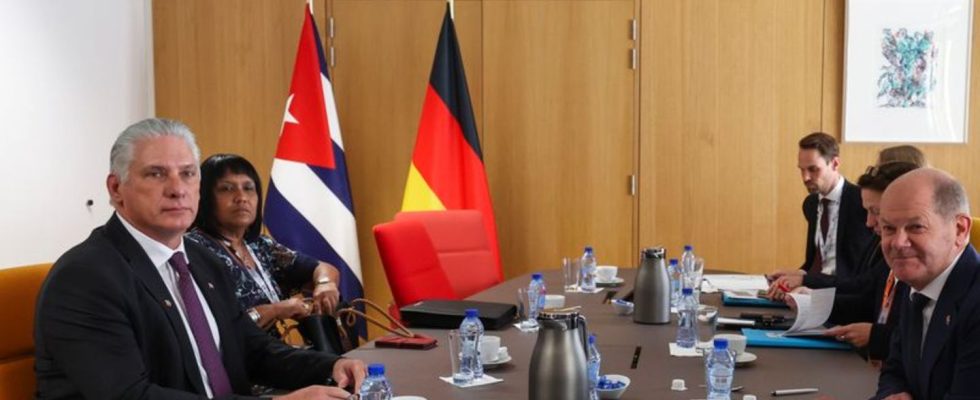diplomacy
Russia’s allies cause a scandal at the Brussels summit
Chancellor Olaf Scholz (r) sits at the table with Miguel Diaz-Canel, President of Cuba. photo
© Geert Vanden Wijngaert/AP Pool/AP
Latin American allies of Kremlin chief Vladimir Putin block clear condemnation of Russia’s war on Ukraine at a major intercontinental summit in Brussels. Is there a reward?
The EU’s first major summit meeting with Latin American and Caribbean countries in eight years has been overshadowed by disputes over a declaration on the Ukraine war. Countries allied with Russia such as Nicaragua, Venezuela and Cuba started the two-day gathering Brussels confirmed that the text contains no explicit condemnation of the war and does not even mention Russia.
In the end, Nicaragua did not even want to accept a minimal compromise. According to diplomats, the reason was that there was talk of a “war against Ukraine” and the “need for a just and sustainable peace”.
EU wanted clear message to Putin
The aim of the EU was to send a clear message to Russian President Vladimir Putin with the summit declaration. It should be made clear to the latter that he is increasingly isolated in the world community and must fear further economic disadvantages if the war of aggression continues. The hope was that powerful Latin American countries like Brazil would influence smaller states at the summit meeting to persuade them to condemn Russia’s war of aggression.
In the end, it could only be jointly determined that the ongoing war against Ukraine is causing immense human suffering and, for example, increasing existing vulnerabilities in the global economy. The fact that the majority of the summit participants condemned Russia for the war of aggression was made clear only indirectly with a reference to the corresponding resolutions of the United Nations General Assembly. In them, Russia was last asked to withdraw from Ukraine in February. 141 of the 193 member states of the United Nations voted in favor in February.
At the time, Central American Nicaragua was one of only seven countries to vote against the adoption of the resolution. Cuba abstained and Venezuela did not vote.
Top political representatives from 60 countries took part in the summit in Brussels – from South America, among others, Brazil’s President Luiz Inácio Lula da Silva and Argentina’s President Alberto Fernández.
Ortega and Maduro are clearly behind Putin
Nicaragua’s President Daniel Ortega and Venezuela’s Head of State Nicolás Maduro were represented. Most recently, after the uprising of the Russian private army Wagner, both had clearly backed Putin – together with Cuban President Miguel Díaz-Canel.
“We send our hugs of solidarity and support to the President of the Russian Federation, Vladimir Putin, who managed to manage an attempt at betrayal and civil war, guaranteeing his people victory and peace,” Maduro tweeted in June . An official statement from Central American Nicaragua said President Ortega and his wife, along with Vice President Rosario Murillo, conveyed “our affection in revolutionary brotherhood” to Putin.
Ireland’s Prime Minister Leo Varadkar had already said before the negotiations failed that a large majority of the summit participants supported a declaration according to which Ukraine had the right to territorial integrity and self-determination. At a summit like the one in Brussels, however, the wording of declarations is determined by consensus and not by majority decision. This means that a declaration can only be passed if nobody objects.
Reward from Moscow?
It was initially unclear whether Russia’s allies can expect a reward from Moscow for their steadfastness in Brussels. In the past, there had been repeated offers of help from Moscow for the three countries – sometimes also in the military area. Venezuela also received arms.
The dispute over the Ukraine declaration pushed the fact that the EU and the Latin American and Caribbean states agreed in principle to further expand their cooperation into the background. For example, the fight against climate change and its negative consequences should be promoted together.
At the closing press conference, EU Council President Charles Michel spoke of a “new, optimistic and positive chapter” in the relationship and announced that there should now be top-level meetings every two years.
There is also hope that efforts to conclude the free trade agreement between the EU and the South American economic community Mercosur can be completed by then. Brazilian President Lula, the current Spanish EU Presidency and other participants have expressed their intention to reach an agreement by the end of the year – although there has been no concrete progress.
After years of negotiations, a basic political agreement was reached in the summer of 2019 on the establishment of a huge free trade zone between the EU and the Mercosur states of Brazil, Argentina, Uruguay and Paraguay. However, the deal is now being questioned again by several EU countries such as France and Austria. Critics fear that European farmers will be forced into a merciless price war in the future and at the same time the destruction of the rainforest in South America will be fueled.

